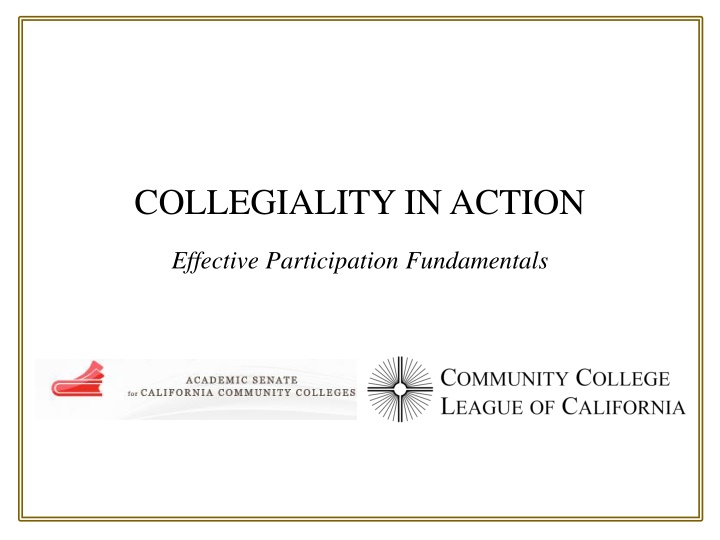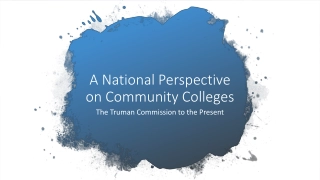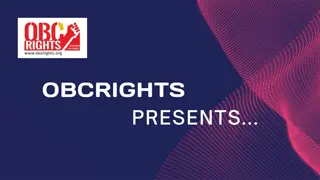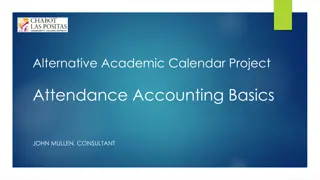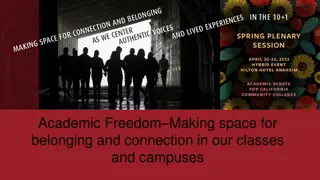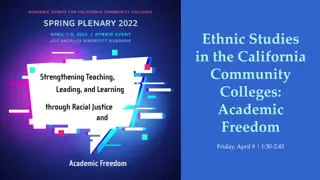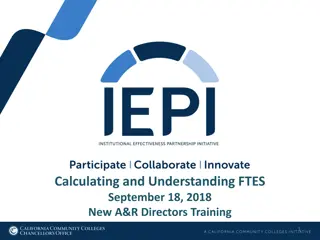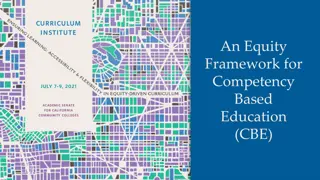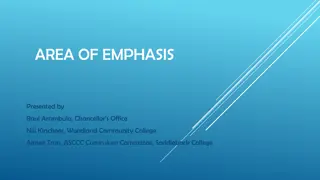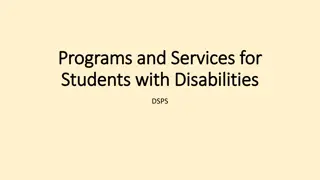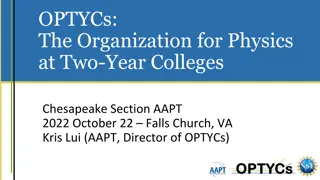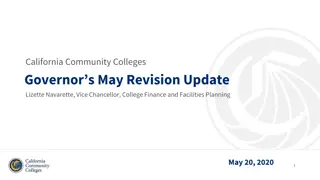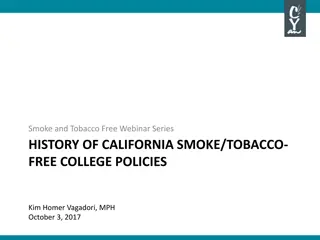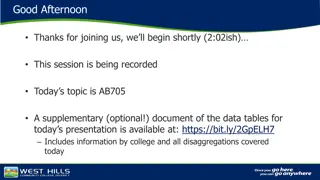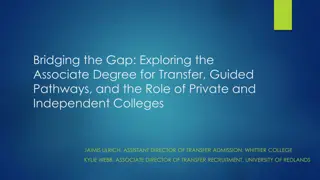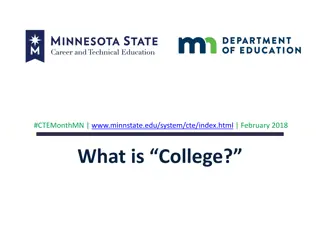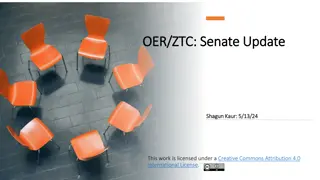Collegial Governance in California Community Colleges: A Historical Overview
Delve into the evolution of collegial governance in California's community college system, examining the roles of key players like the academic senate, administrators, and trustees. Explore the missions and milestones from its inception in 1907 through transformative legislation like AB1725, shaping faculty qualifications, diversity goals, and funding priorities.
Download Presentation

Please find below an Image/Link to download the presentation.
The content on the website is provided AS IS for your information and personal use only. It may not be sold, licensed, or shared on other websites without obtaining consent from the author.If you encounter any issues during the download, it is possible that the publisher has removed the file from their server.
You are allowed to download the files provided on this website for personal or commercial use, subject to the condition that they are used lawfully. All files are the property of their respective owners.
The content on the website is provided AS IS for your information and personal use only. It may not be sold, licensed, or shared on other websites without obtaining consent from the author.
E N D
Presentation Transcript
COLLEGIALITY IN ACTION Effective Participation Fundamentals
Introductions and Context Dolores Davison, President, Academic Senate for California Community Colleges In every college, situations raise issues regarding the respective roles of key players in governance. We are here primarily to address the relationships among the academic senate, administrators, and the board of trustees but also to discuss how these groups work constructively with students, classified staff, and faculty unions to assure collegial governance of the institution. Larry Galizio, PhD, President, Community College League of California
The California Community College System When did we begin? Where did we begin? What is our mission?
A Little Bit of HistoryThe CCC Mission 1907 Public Junior Colleges established in California to teach the first two years of university study for high school graduates. Donahoe Act/Master Plan sets primary missions of the junior colleges as transfer courses, vocational and technical study leading to employment, and general or liberal arts courses; and authorizes remedial instruction, ESL, adult noncredit, & community service courses. Name changed to community colleges and community services added to the mission. 1960 1976
A Little Bit of HistoryThe CCC Mission AB 1725 (Vasconcellos) sets the following mission priorities: 1988 Lower Division Arts and Sciences Vocational and Occupational Fields Remedial Instruction Adult Noncredit Education Community Service Courses and Programs
AB1725: Redefining Our System What did AB 1725 do? What did AB 1725 do? Funding system changed Mission priorities set Established faculty qualifications, tenure periods, evaluation processes Set goal of 75% full-time faculty Funding for professional development Diversity goals set Delineated governance and decision-making
AB1725: Redefining Our System What was the intent of AB 1725? What was the intent of AB 1725? Enhance community college image Increase support for more money Move from K-12 to higher education Develop more unified system Institutional renewal
A Bit More HistoryThe CCC Mission 2017 Board of Governors approves the Vision for Success 2020 Board of Governors elects its first African American president and elects a female president and vice president together for the first time
Governance in the California Community Colleges What is participatory governance? What is shared governance? What is the difference?
Participatory Governance not a simple process to implement goodwill, thoughtful people, a willingness to take risks and the ability to admit problems exist can go far toward establishing a positive environment The central objective should be creation of a climate where energy is devoted to solving crucial educational tasks and not to turf battles over governance. CCCT/CEOCCC Policy Paper, December 1989
Scenario #1 One of the district s governing board members recently attended a conference and saw a presentation on open educational resources. The board member came back enthused with this concept and has asked the college president to find ways to increase the college s use of such materials. The president explains that the college already has an OER initiative and that faculty are being educated about OER opportunities and encouraged to adopt such materials where appropriate. The board member states that encouragement of faculty is not sufficient because making materials affordable for students is too important and presses the president to pursue a plan to mandate the use of such materials and present it to the board for approval.
Questions To Ask What is the issue? Is there legal language or other documentation that should be cited? What is the process that should be followed? If it wasn t followed, what suggestions do you have for making sure that the correct process is followed?
Answers to Scenario #1 Issue: The issue is the governing board members role in making and implementing curriculum decisions. Citation: California Education Code 70902(A)(1) states, Every community college district shall be under the control of a board of trustees. . . the governing board may initiate and carry on any program, activity, or may otherwise act in any manner that is not in conflict with or inconsistent with, or preempted by, any law and that is not in conflict with the purposes for which community college districts are established. Final decision-making authority for the district thus clearly rests with the governing board. However, Education Code 70901(b)(1)(E) guarantees the right of academic senates to assume primary responsibility for making recommendations in the areas of curriculum and academic standards. Title 5 53200(c) lists the areas of academic and professional matters on which districts must consult with academic senates before making decisions, and curriculum is the first item on that list. Choice and adoption of instructional materials is an integral aspect of curriculum design and delivery and is therefore subject to consultation with the academic senate. Process: The college president should continue the college s efforts to educate faculty regarding the possibilities of open educational resources and may even encourage faculty to consider such materials as appropriate. The board member is entitled to request a report or even periodic reports on the college s status in regard to the adoption of OER materials. However, no program to encourage the adoption of any instructional materials should be implemented without consultation with the academic senate, and no action should be taken by the board or the administration to mandate the adoption of such materials.
Answers to Scenario #1 Suggestion: Governing board members should rightly be interested in and concerned with curricular programs that benefit students and may be updated on the progress or status of such programs through reports in writing or at board meetings. Members are well within their rights to ask questions about and make observations and suggestions regarding such programs. However, in decisions regarding curriculum development, boards should trust in and rely on consultation with the academic senate and the judgement of the college s curriculum committee, and boards and administrators should respect the expertise of discipline faculty regarding the delivery of that curriculum.
Title 5 Terminology: Effective Participation Participating effectively in district and college governance is shared involvement in the decision-making process. It does not imply total agreement; The same level of involvement by all is not required; and Final decisions rest with the board.
Benefits and Values of Our Governance System Expertise and analytical skills of many Understanding of objective/decisions Commitment to implementation Leadership opportunities Promotion of trust and cooperation Opportunities for conflict resolution Less dissent
Challenges of Our Governance System Participation by individuals with limited expertise Time away from other duties Can require considerable time for decision Shared accountability Differing expectations and understanding Potential conflict if board/designee rejects recommendation
The LawEducation Code Board of Governors shall establish "minimum standards" and local governing boards shall "establish procedures not inconsistent" with those standards to ensure the following: Faculty, staff and students the right to participate effectively in district and college governance The right of academic senates to assume primary responsibility for making recommendations in the areas of curriculum and academic standards. Education Code Sections 70901 and 70902
Regulation: Academic Senate Role (a) The governing board shall adopt policies for appropriate delegation of authority and responsibility to its academic senate. providing at a minimum the governing board or its designees consult collegially with the academic senate when adopting policies and procedures on academic and professional academic and professional matters matters. ( (Title 5 53203) "Consult collegially" means 1. Relying primarily upon the advice and judgment of the academic senate; or 2. Reaching mutual agreement between the governing board/designee and representatives of the academic senate. ( (Title 5 53200)
Questions on Collegial Consultation Who decides which of the two processes in the regulations, rely primarily or mutual agreement, should be used on a given issue? Must a local board select only one procedure for addressing all ten of the identified academic and professional matters, or can there be a different approach used for the different matters?
Regulation: Academic Senates (d)(1) Governing board action: Rely Primarily recommendations of the senate will normally be accepted only in exceptional circumstances and for compelling reasons will the recommendations not be accepted If not accepted, board/designee communicate its reasons in writing, if requested Title 5 53200
Regulation: Academic Senates Title 5 53200(d)(2) Governing board action: Mutual Agreement If agreement not reached, existing policy remains in effect unless exposure to legal liability or substantial fiscal hardship. If no policy or existing policy creates exposure to legal liability or substantial fiscal hardship board may act if agreement not reached if good faith effort first only for compelling legal, fiscal, or organizational reasons
Regulation: Academic Senates Academic and professional matters Academic and professional matters means the following policy development and implementation matters: 1. Degree and certificate requirements 2. Curriculum, including establishing prerequisites and placing courses within disciplines 3. Grading policies 4. Educational program development 5. Standards or policies regarding student preparation and success Title 5 53200
Regulation: Academic Senates Academic and professional matters Academic and professional matters means the following policy development and implementation matters: 6. District and college governance structures, as related to faculty roles 7. Faculty roles and involvement in accreditation processes, including self-study and annual reports 8. Policies for faculty professional development activities 9. Processes for program review 10.Processes for institutional planning and budget development, and
Regulation: Academic Senates Academic and professional matters Academic and professional matters means the following policy development and implementation matters: Plus one : Other academic and professional matters as mutually agreed upon between the governing board and the academic senate.
Consultation process for academic and professional matters: What Are the FHDA Board Policies Where the Academic Senate is Rely Primarily ? AREA 1. Curriculum JOINT DEVELOPMENT PRIMARY RELIANCE X 2. Degree and Certificate requirements: General Ed. and Program Specific Units for degree X X X 3. Grading policies 4. Educational Program Development X 5. Standards regarding student preparation and success 6. Governance structures as related to faculty roles X X 7. Faculty involvement in accreditation X 8. Policies for faculty professional development activities other than contractual aspects X 9. Policies for Program Review X 10. Processes for institutional planning and budget development X Whether primary reliance or joint development to be determined on an individual basis by the Board or its designee. 11. Other Academic and Professional Issues
Legal Provisions Related to Academic Senates Equivalencies to Minimum Qualifications: Process, criteria and standards agreed upon jointly by board designee and academic senate Ed Code 87359 Faculty Hiring: Criteria, policies and procedures shall be agreed upon jointly by board designee and academic senate Ed Code 87360 Administrator Retreat Rights Administrator Retreat Rights: Process agreed upon jointly; board to rely primarily upon the advice and judgment of the academic senate to determine that the administrator possesses minimum qualifications for employment as a faculty member Ed Code 87458
Legal Provisions Related to Academic Senates Curriculum Committee: Established by mutual agreement of administration and academic senate Title 5 55002 Appointments to College Bodies Appointments to College Bodies: The appointment of faculty members to serve on college or district committees, task forces, or other groups dealing with academic and professional matters, shall be made, after consultation with the chief executive officer or his or her designee, by the academic senate. Notwithstanding this subsection, the collective bargaining representative may seek to appoint faculty members to committees, task forces, or other groups. Title 5 53203 (f)
Legal Provisions Related to Faculty Collective Bargaining Collective Bargaining Decision-making policies and implementation cannot detract from negotiated agreements on wages and working conditions Academic senate and bargaining representatives may establish agreements as to consulting, collaborating, sharing or delegating (Title 5 53204) In those districts where the following are collectively bargained, the exclusive bargaining agent shall consult with the academic senate prior to engaging in bargaining on: Faculty Evaluation (Ed Code 87663), Tenure (Ed Code 87610.6) and Faculty Service Areas (Ed Code 87743.2)
Staff Roles in College Governance Governing boards adopt policies and procedures that provide staff opportunity to participate effectively in district and college governance. formulation and development of policies and procedures, and processes for jointly developing recommendations that have or will have a significant effect on staff. Board shall not take action on matters significantly affecting staff until the recommendations and opinions of staff are given every reasonable consideration. Title 5 51023.5
Student Roles in College Governance Governing boards adopt policies and procedures that provide students opportunity to participate effectively in district and college governance on formulation and development of policies and procedures and processes for jointly developing recommendations that have or will have a significant effect on students. Board shall not take action on a matter having a significant effect on students until recommendations and positions by students are given every reasonable consideration. Title 5 51023.7
Regulation: Students Polices and procedure that have a significant effect on students include : (1) grading polices (2) codes of student conduct (3) academic disciplinary policies (4) curriculum development (5) courses or programs which should be initiated or discontinued (6) processes for institutional planning and budget development (7) standards and polices regarding student preparation and success (8) student services planning and development (9) student fees within the authority of the district to adopt (10) any other district and college policy, procedure or related matter that the district governing board determines will have a significant effect on students Title 5 51023.7
Important Notes on Collegial Consultation The Board has the final say The Board is never prohibited from acting Exceptional circumstances and "compelling reasons" vs. "compelling legal, fiscal, or organizational reasons"
Scenario #2 As the college engages in the implementation of a new guided pathways framework, the college president announces the formation of an administrative task force that will oversee the development of the framework. The academic senate president approaches the college president and asks that faculty be included with equal representation on the task force, as many of the aspects of guided pathways involve academic and professional matters, and that collegial consultation should take place before reaching any decision involving academic and professional matters. The college president responds that consultation with the academic senate on academic and professional matters is required only at the policy level and that since the task force will not be developing new formal policies, consultation is not a requirement.
Questions to Ask What is the issue? Is there legal language or other documentation that should be cited? What is the process that should be followed? If it wasn t followed, what suggestions do you have for making sure that the correct process is followed?
Answers (Scenario #2) Issue: The issue is the level and circumstances for which collegial consultation on academic and professional matters is required, especially but not limited to initiatives mandated by the legislature or promoted by the CCC Chancellor s Office. Citation: Title 5 53203(a) states, The governing board of a community college district . . . shall provide that the governing board or its designees will consult collegially with the academic senate when adopting policies and procedures on academic and professional matters. This requirement to consult collegially shall not limit other rights and responsibilities of the academic senate which are specifically provided in statute or other Board of Governors regulations. The language in this section specifically identifies both policies and procedures. Indeed, while the list of academic and professional matters in Title 5 53200 specifies the requirement for consultation at the policy level in certain cases such as standards or policies regarding student preparation and success and policies for faculty professional development activities in other cases it specifically references processes such as processes for institutional planning and budget development and in still others makes no specific reference to the level of consultation and appears to refer to the topic as a whole such as curriculum, including establishing prerequisites and placing courses within disciplines. Furthermore, the concluding language in 53203(a) explicitly does not place limitations on consultation with the academic senate. Often the context of the issue at hand will determine whether an issue is an academic and professional matter and the point at which consultation should take place. Both administration and faculty must work in good faith to establish reasonable processes that allow the administration to make operational decisions while fully respecting the faculty voice and the academic senate s right to collegial consultation.
Answers (Scenario #2) Process: While the implementation of an initiative such as guided pathways may impact formal board policy, consultation with the academic senate on academic and professional matters is not limited to the level of policy development. While some aspects of the implementation may indeed be purely organizational and may not be subject to consultation, the development of a framework for any such initiative clearly impacts college planning and may touch on the processes for other academic and professional matters such as budgeting, processes to promote student success, and curriculum, among others. The academic senate president should again approach the college president, cite the specific language of Title 5 that does not limit consultation with the senate to formal policy development, and request that the senate be included in the development and membership of task force that will engage in planning the guided pathways framework. Suggestion: While consultation with the academic senate in the planning of an initiative like guided pathways or the Student Equity and Achievement Program is mandatory, the success of any such college-wide initiative requires the involvement and dedication of other college constituencies as well. Rather than developing a plan on its own, administration is generally better served by greater inclusion of and transparency to all constituent groups, even when such inclusion is not required.
Scenario #3 The college has for several years had two separate groups that oversee and coordinate professional development, one for faculty and another for classified staff and administration. The new Vice President of Human Resources sees this structure as inefficient, noting that many professional development activities are equally relevant to all constituent groups. The new vice president therefore announces the intention of combining the two committees under the leadership of a classified administrator who will be responsible for overseeing all professional development at the college. The academic senate objects to this plan, stating that faculty professional development falls under the senate s purview and that it must therefore be considered and overseen only by faculty separately from other professional development efforts at the college.
Questions to Ask What is the issue? Is there legal language or other documentation that should be cited? What is the process that should be followed? If it wasn t followed, what suggestions do you have for making sure that the correct process is followed?
Answers (Scenario #3) Issue: professional development. Citation: Title 5 53200(c)(8) lists Policies for faculty professional development activities as an academic and professional matter. The structure of oversight for professional development is an issue at the policy level and therefore falls under academic senate purview. Title 5 53203(d) provides the definitions that apply to collegial consultation on academic and professional matters and indicates that districts must either rely primarily on recommendations of the academic senate or must reach mutual agreement with the senate. The definitions further indicate that, even in extreme or compelling circumstances, changes to policy or procedure cannot be implemented until a good faith effort at such consultation with the academic senate has taken place. Process: Title 5 places policies for faculty professional development activities as an academic and professional matter under academic senate purview; it does not indicate that all faculty professional development must be directly overseen and coordinated by the academic senate or by faculty. In this scenario, the vice president should consult with the academic senate, explain the reasons for wishing to combine the committees, and work to reach agreement on an acceptable structure. The academic senate should ensure that faculty retain an appropriate voice in oversight and development of faculty professional development, but such a voice does not preclude a joint effort with other constituencies. No change should be made to the existing structure until such agreement is reached. The issue is the academic senate s role in oversight of faculty
Answers (Scenario #3) Suggestion: effective overall professional development committee, including a faculty co-chair for the committee and a separate process for approval of activities specific to faculty professional development that allows for greater faculty control. A cooperative structure might be developed to the benefit of all college constituencies while still preserving the academic senate s voice in matters specific to faculty professional development. Various structures could exist to achieve an
REGULATIONS CONSIDERATION OF RECOMMENDATIONS REGULATIONS LEVEL OF PARTICIPATION REGULATIONS AREAS OF PARTICIPATION LAW FACULTY *Right to participate effectively *Local boards shall: *Academic and professional matters *Consult collegially Consult collegially on Academic and professional matters Reach mutual agreement Rely primarily on advice and judgment of academic senate *Academic Senate right to assume primary responsibility for recommending on: 1.Curriculum 2.Degree 3.Grading 4.Program development 5.Student standards 6.Faculty role in governance structures 7.Accreditation 8.Professional development 9.Processes for program review 10.Processes for planning & budget Curriculum Academic standards 11.Other STAFF *Right to participate effectively *Significant effect on staff *Provided opportunity to participate in formulation of: *Given every reasonable consideration Policies, Procedures, and Processes that have a Significant effect on staff. STUDENTS *Right to participate effectively *Provided opportunity to participate in formulation of *Significant effect on students *Given every reasonable consideration 1.Grading 2.Codes of conduct 3.Academic discipline 4.Curriculum development 5.Program creation and discontinuance 6.Processes for budget & planning 7.Student preparation and success 8.Student services planning & development 9.Fees Policies, Procedures and Processes that have a Significant effect on students. 10.Other
Thank You Dolores Davison Dolores Davison President Academic Senate for California Community Colleges www.asccc.org Larry Larry Galizio Galizio President Community College League of California https://www.ccleague.org
